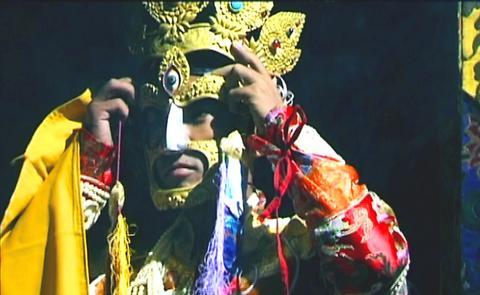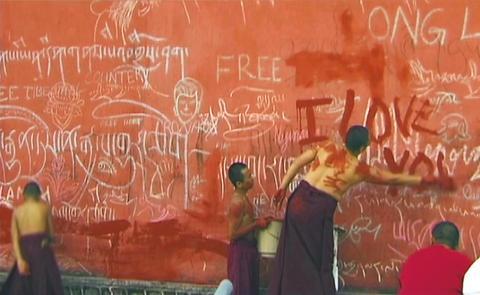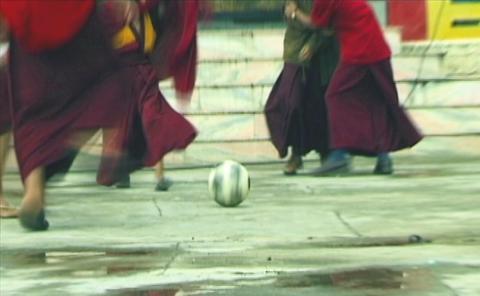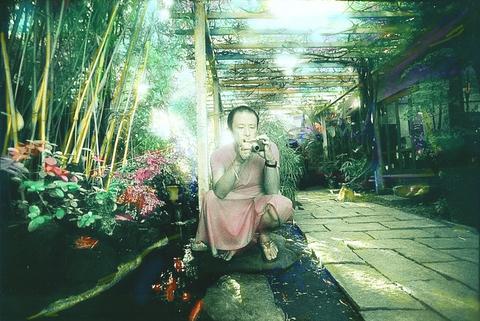Why does one go to the cinema? For some, it is to escape the reality of life. For Anika Tokarchuk, cinema is the reality of her life. For the past six years, her existence has revolved around the shifting images, sounds, and characters on the screen. Recently, the Canadian filmmaker who is now living in Taipei debuted her documentary, Life as Cinema, on Public Television Service (PTS,
What started off in 1998 as a documentary on the making of The Cup by Dzongsar Khyentse Rinpoche led Tokarchuk on a journey from Canada through Europe, India and finally to Taiwan. Her project has turned into a three-part series, drawing on support from respected members of the Taiwanese film industry and various buddhist organizations.
"This documentary started off as Rinpoche's idea," Tokarchuk said. "Of course, I really was excited about it, but I had no idea how incredible and how wild the adventure would be. I've lived through this whole amazing experience while making this film, and by doing so I think it has molded the character of the film."

PHOTO COURTESY OF ANIKA TOKARCHUK,IMAGE LANTERN PICTURES LTD
At first, the road was smooth. With a conditional approval for funding through the Canadian film and television industry, Tokarchuk left to begin shooting in India. Six months later, however, on the same day she received permission to interview the Dalai Lama, the offer for funding was unexpectedly withdrawn. Having explored all avenues for financial support before leaving Canada, Tokarchuk felt returning was not an option. To make things worse, she had only US$200 remaining and no return flight.
"It really felt like a dead end to go back. And plus I had my film 80 percent made, it's kind of like if you are seven months pregnant you can't have an abortion, you have to go through with it," she said.
Contemplating her next move, Tokarchuk remained in Dharamshala, where she met a number of individuals teaching English in north-east Asia. Taiwan, a prosperous English teaching market and a country with a growing relationship with Tibet -- both in funding and number of dharma students -- seemed to offer the best environment for Anika's film.

PHOTO COURTESY OF ANIKA TOKARCHUK,IMAGE LANTERN PICTURES LTD
A coincidental meeting with the well-known Taiwanese director, Stan Lai (
Two years went by and Tokarchuk took up residence in Taiwan as an English teacher. After earning enough money to furbish her own home film studio, she was ready to begin the arduous job of editing. An increasingly visible future slowly emerged through a web of connections, one of which is Hung Hung (
Associate director of Life as Cinema, Hung encouraged

PHOTO COURTESY OF ANIKA TOKARCHUK,IMAGE LANTERN PICTURES LTD
Tokarchuk to "go wild" with the 200-hours of footage. "It is much more than a film to her," said Hung, "It is a journey of discovery and the Buddhist dharma that she was practicing through the making of this film. She needed to continue, to finish the project."
Hung said that, to some people, the film might be too experimental in its approach. "Some films need to be seen twice to be understood," he said, implying it's not easy to digest a real meal after being fed junk food for so long.
Sylvia Feng (

PHOTO COURTESY OF ANIKA TOKARCHUK,IMAGE LANTERN PICTURES LTD
One scene in the documentary covers a discussion held at the famed Wisteria Tea House in Taipei. Feng said, "No Taiwanese photographer could capture the aura of Wisteria Tea House [a popular meeting place for"intellectuals'] better than Anika [Tokarchuk] ... her visualization of the intellectual culture in Taipei may spark enlightenment for Taiwanese directors."
The appreciation of Tokarchuk's film, however, goes beyond just artistic or intellectual circles. The Hao Ran Foundation (
Another supporter, Su-Jei Own (

PHOTO COURTESY OF ANIKA TOKARCHUK, IMAGE LANTERN PICTURES LTD
Tokarchuk's experience of making the film changed her perceptions, as she thought they would. "The experience that I've gone through has been my version of living through the themes in Life as Cinema. It really has been this experience of living in this amazing reality."

June 2 to June 8 Taiwan’s woodcutters believe that if they see even one speck of red in their cooked rice, no matter how small, an accident is going to happen. Peng Chin-tian (彭錦田) swears that this has proven to be true at every stop during his decades-long career in the logging industry. Along with mining, timber harvesting was once considered the most dangerous profession in Taiwan. Not only were mishaps common during all stages of processing, it was difficult to transport the injured to get medical treatment. Many died during the arduous journey. Peng recounts some of his accidents in

“Why does Taiwan identity decline?”a group of researchers lead by University of Nevada political scientist Austin Wang (王宏恩) asked in a recent paper. After all, it is not difficult to explain the rise in Taiwanese identity after the early 1990s. But no model predicted its decline during the 2016-2018 period, they say. After testing various alternative explanations, Wang et al argue that the fall-off in Taiwanese identity during that period is related to voter hedging based on the performance of the Democratic Progressive Party (DPP). Since the DPP is perceived as the guardian of Taiwan identity, when it performs well,

A short walk beneath the dense Amazon canopy, the forest abruptly opens up. Fallen logs are rotting, the trees grow sparser and the temperature rises in places sunlight hits the ground. This is what 24 years of severe drought looks like in the world’s largest rainforest. But this patch of degraded forest, about the size of a soccer field, is a scientific experiment. Launched in 2000 by Brazilian and British scientists, Esecaflor — short for “Forest Drought Study Project” in Portuguese — set out to simulate a future in which the changing climate could deplete the Amazon of rainfall. It is

The Taiwan People’s Party (TPP) on May 18 held a rally in Taichung to mark the anniversary of President William Lai’s (賴清德) inauguration on May 20. The title of the rally could be loosely translated to “May 18 recall fraudulent goods” (518退貨ㄌㄨㄚˋ!). Unlike in English, where the terms are the same, “recall” (退貨) in this context refers to product recalls due to damaged, defective or fraudulent merchandise, not the political recalls (罷免) currently dominating the headlines. I attended the rally to determine if the impression was correct that the TPP under party Chairman Huang Kuo-Chang (黃國昌) had little of a